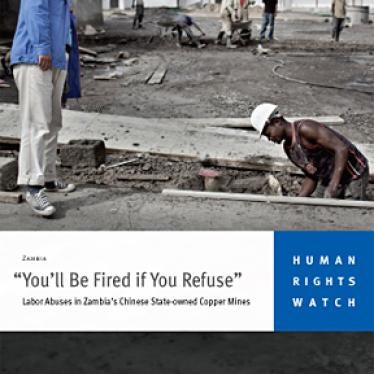“If someone dies, he can be replaced tomorrow, and if you report the problem, you’ll lose your job.” This, in the words of a Zambian copper miner, describes the downside of the growing investment of Chinese companies in Africa over the last decade.
The Chinese state-run China Non-Ferrous Metals Mining Corporation (CNMC) entered the Zambian copper mining sector in 1998 and began operations through subsidiaries in 2003. Almost a decade later, it is possible to see both the real potential of this investment and the company’s often dreadful labor rights record.
Miners universally recognize that the Chinese-run companies saved existing jobs and are creating thousands of new ones. Copper mines that were dilapidated under previous investors, with almost no capital upgrading or even maintenance, are being modernized and expanded. Yet the good will is offset by persistent labor abuses. Collective bargaining negotiations began early this month, and the atmosphere is tense.
When we interviewed Zambian copper miners over the last year, they described deplorable health and safety practices and managers’ threats to fire them if they wouldn’t work in areas they reasonably believed were unsafe. In underground mining work, already dangerous, this raises the potential for serious, and even deadly, accidents. Company safety officers told us they have no authority, overruled by Chinese managers who appear primarily interested in ensuring that production never slows.
Several Chinese-run copper mining companies require miners to work brutally long hours – 72-hour work weeks for some, 365 days without an off day for others – in an environment with acid, noxious fumes, and a heavy concentration of dust. Chinese-run companies generally refuse to replace protective equipment damaged during work; a glove with a hole means an acid burn the next time the acid splashes up. These bad safety practices lead to preventable accidents, often with long-term health consequences.
Miners also described being threatened or bribed not to report minor accidents to the Zambian government’s Mines Safety Department. Several temporary workers at one Chinese-run copper processing plant, who unlike contract employees do not receive safety equipment, described being locked out of sight in another room when Zambia’s former president, Rupiah Banda, came to visit their plant.
Chinese-run firms in Zambia appear to be exporting abuse along with investment. Many of these practices are strikingly similar to the ones that plague China’s domestic mining industry. In an interview with Chinese media, one major investor said that Zambians should “learn to accept” that “inequalities are a reality at every stage of development.” While such attitudes may not bother corruptible governments, they will not win any friends among the workers and communities that are indispensable to an investment’s long-term success.
The Chinese-run companies have made some improvements, but remain in routine violation of Zambian and international law, and perform considerably worse on labor rights than other multinationals in Zambia’s copper industry. Still, the improvements show that there is neither an inherent link between Chinese investment and poor labor practices nor complete inflexibility. Indeed, the companies appear responsive to pressure from host governments and do care about their image.
The role of the host state is fundamental. The Chinese-run companies have taken advantage of Zambia’s ineffectual Mines Safety Department and Labor Ministry. Human Rights Watch work shows, of course, that many Western companies likewise take advantage of weak labor standards and enforcement around the world, exploiting local work forces. But in Zambia, the Chinese-run companies are the worst on health and safety, working hours, and the right to organize.
Zambia’s new government has given workers reason for hope. Michael Sata, a longtime opposition leader who has been critical of Chinese labor practices, was elected president on September 20. In response, miners in the Chinese-run companies initiated strikes in early October. The main Chinese-run copper mine responded by firing at least 1,000 workers. After several days of government pressure, however, the company reinstated the workers.
Obtaining the full benefit of Chinese investment will not come simply from loud rhetoric and finger pointing, though. The Zambian government needs to revamp regulatory bodies responsible for overseeing the mining industry. The Chinese-run companies have shown themselves capable of abiding by labor laws when they are enforced, but Zambia’s regulations have only been strong on paper.
In a letter responding to Human Rights Watch’s main findings, CNMC promised to “conduct more detailed, comprehensive and in-depth investigations, focusing on the issues that you have raised, or have yet to raise.” If action meets commitment by both the company and the new government, Zambia may become a model for how Chinese business ventures in Africa can benefit all parties involved, including the so-far forgotten workers.
As Chinese companies invest across Africa, the question – a critical one – is on whose terms. Will the companies operate outside the law, or will governments protect their workers’ rights, with benefits for the local population and the Chinese investors?
Matt Wells is an Africa researcher at Human Rights Watch and author of the new report, “You’ll Be Fired if You Refuse”: Labor Abuses in Zambia’s Chinese State-owned Copper Mines.







